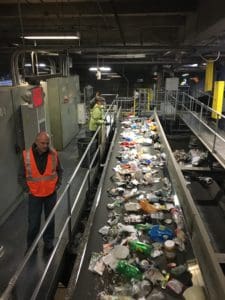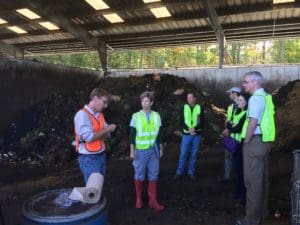Reducing Landfill Waste with Innovative SEED Program
 This month we’re spotlighting the Casella Waste Systems SEED™ (Sustainable Environmental and Economic Development) program. Our CEO Paul Boudreau and the UrthPact leadership team went to see Casella in action last November. Casella is serious about separating the 230,000 tons of glass, aluminum, paper, and plastic waste to ensure usable component sources for companies that want to use recycled materials in their manufacturing process. It is programs like Zero-Sort Recycling at CSC and UrthPact compostable plastic injection molding techniques that are working to change the course of our landfills.
This month we’re spotlighting the Casella Waste Systems SEED™ (Sustainable Environmental and Economic Development) program. Our CEO Paul Boudreau and the UrthPact leadership team went to see Casella in action last November. Casella is serious about separating the 230,000 tons of glass, aluminum, paper, and plastic waste to ensure usable component sources for companies that want to use recycled materials in their manufacturing process. It is programs like Zero-Sort Recycling at CSC and UrthPact compostable plastic injection molding techniques that are working to change the course of our landfills.
It would be nice to think that all non-recyclable waste is going away sometime soon. The reality of the matter is that it is not. As a society, we will continue to be confronted by the need to dispose of a wide range of waste. However, companies like Casella and UrthPact are stepping up to address the challenge in a significant way by streamlining recycling to recapture as much waste material as possible and keep it in the manufacturing and consuming cycle. Instead of being relegated to wasteful, one-time consumption, materials used in manufacturing are kept in active use, not cast off to fill up landfills and incinerators. The way we see it, here at UrthPact, we’re helping communities and universities like Dartmouth reach their sustainability goals by making compostable bioplastic products while Casella helps on the disposal end with single stream recycling and commercial composting facilities.
For example, UrthPact team members saw how Casella’s Zero-Sort® Recycling solution simplifies the recycling process for consumers and business alike by allowing them to simply place all of their recyclable materials in one bin (single-stream recycling). This enables more materials to be recycled more frequently because it takes less effort and thought on the part of home- and business-owners who no longer have to sort and store recyclables separately, by category and type.
 Last October, Urthpact CEO Paul Boudreau sent his leadership team to
Last October, Urthpact CEO Paul Boudreau sent his leadership team to